
105 Results

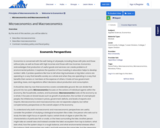
By the end of this section, you will be able to:Describe microeconomicsDescribe macroeconomicsContrast monetary policy and fiscal policy
- Subject:
- Applied Science
- Economics
- Material Type:
- Module
- Date Added:
- 02/27/2020

By the end of this section, you will be able to:Discuss the importance of studying economicsExplain the relationship between production and division of laborEvaluate the significance of scarcity
- Subject:
- Applied Science
- Economics
- Material Type:
- Module
- Date Added:
- 02/27/2020

With this free video resource, students will explore the economic way of thinking, and the role incentives play in all our lives through engaging Hollywood production style videos.
Educators can use MRU's videos in a variety of ways, to include “flipping” the classroom, as study aids, supplementary material, concept reinforcement, or even as a full course offering.
In MRU's Principles of Macroeconomics course, we’ll cover fundamental questions such as: Why do some countries grow rich while others remain poor? How important is a country’s banking system — and what happened during the recent financial crisis? How did Zimbabwe end up with an inflation rate that rose into the quadrillions?
We’ll also cover important topics like the Federal Reserve, monetary policy, fiscal policy, the Solow Growth Model, institutional analysis, the “economics of ideas,” and more.
------------------------------------
What is Marginal Revolution University (MRU)?
Many of us can remember our first great economics teacher who fundamentally changed how we see the world. At MRU, we try and deliver that experience to millions worldwide through video.
Founded as a nonprofit in 2012 by George Mason University economics professors Tyler Cowen and Alex Tabarrok, MRU is building the world’s largest online library of free economics education videos -- currently weighing in at more than 800 videos.
- Subject:
- Economics
- Social Science
- Material Type:
- Full Course
- Homework/Assignment
- Lecture
- Module
- Author:
- Alex Tabarrok
- Tyler Cowen
- Date Added:
- 05/10/2020

Principles of Macroeconomics for AP® Courses 2e covers the scope and sequence requirements for an Advanced Placement® macroeconomics course and is listed on the College Board’s AP® example textbook list. The second edition includes many current examples and recent data from FRED (Federal Reserve Economic Data), which are presented in a politically equitable way. The outcome is a balanced approach to the theory and application of economics concepts.
The second edition was developed with significant feedback from current users. In nearly all chapters, it follows the same basic structure of the first edition. General descriptions of the edits are provided in the preface, and a chapter-by-chapter transition guide is available for instructors.
- Subject:
- Economics
- Social Science
- Material Type:
- Textbook
- Provider:
- Rice University
- Provider Set:
- OpenStax College
- Author:
- David Shapiro
- Steven A. Greenlaw
- Date Added:
- 06/14/2019
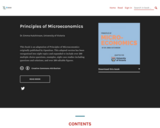
This book is an adaptation of Principles of Microeconomics originally published by OpenStax. This adapted version has been reorganized into eight topics and expanded to include over 200 multiple choice questions, examples, eight case studies including questions and solutions, and over 200 editable figures.
- Subject:
- Economics
- Social Science
- Material Type:
- Textbook
- Provider:
- BCcampus
- Author:
- Dr. Emma Hutchinson
- Date Added:
- 05/10/2020
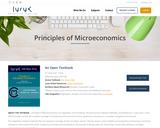
Principles of Microeconomics is an adaptation of the textbook, Microeconomics: Markets, Methods, and Models by D. Curtis and I. Irvine, which provides concise yet complete coverage of introductory microeconomic theory, application and policy in a Canadian and global environment.
- Subject:
- Economics
- Social Science
- Material Type:
- Assessment
- Lecture Notes
- Textbook
- Provider:
- Lyryx Learning
- Author:
- Doug Curtis
- Ian Irvine
- Date Added:
- 06/15/2019
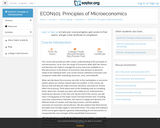
The purpose of this course is to provide the student with a basic understanding of the principles of microeconomics. At its core, the study of economics deals with the choices and decisions that have to be made in order to manage scarce resources available to us. Microeconomics is the branch of economics that pertains to decisions made at the individual level, i.e. by individual consumers or individual firms, after evaluating resources, costs, and tradeoffs. "The economy" refers to the marketplace or system in which these choices interact with one another. In this course, the student will learn how and why these decisions are made and how they affect one another in the economy. Upon successful completion of this course, students will be able to: Think intuitively about economic problems; Identify how individual economic agents make rational choices given scarce resources and will know how to optimize the use of resources at hand; Understand some simplistic economic models related to Production, Trade, and the Circular Flow of Resources; Analyze and apply the mechanics of Demand and Supply for Individuals, Firms, and the Market; Apply the concept of Marginal Analysis in order to make optimal choices and identify whether the choices are 'efficient' or 'equitable'; Apply the concept of Elasticity as a measure of responsiveness to various variables; Identify the characteristic differences amongst various market structures, namely, Perfectly Competitive Markets, Non-Competitive Markets, and Imperfectly Competitive Markets and understand the differences in their operation; Analyze how the Demand and Supply technique works for the Resource Markets. (Economics 101; See also: Business Administration 200)
- Subject:
- Business and Communication
- Economics
- Management
- Social Science
- Material Type:
- Assessment
- Full Course
- Lecture
- Lecture Notes
- Reading
- Syllabus
- Textbook
- Provider:
- The Saylor Foundation
- Date Added:
- 06/14/2019

Principles of Microeconomics covers the scope and sequence of most introductory microeconomics courses. The text includes many current examples, which are handled in a politically equitable way. The outcome is a balanced approach to the theory and application of economics concepts.
- Subject:
- Economics
- Social Science
- Material Type:
- Textbook
- Provider:
- Rice University
- Provider Set:
- OpenStax College
- Author:
- Amyaz Moledina
- Andres Jauregui
- Craig Richardson
- Cynthia Gamez
- Dan MacDonald
- David Shapiro
- Diane Keenan
- Eric Dodge
- Ralph Sonenshine
- Steven Greenlaw
- Timothy Taylor
- Date Added:
- 01/02/2014

An adapted version of the OpenStax Microeconomics open textbook, expanded with examples and concepts that are relevant to students at the University of Hawai'i.
- Subject:
- Economics
- Social Science
- Material Type:
- Textbook
- Provider:
- University of Hawaii
- Provider Set:
- Pressbooks
- Author:
- John Lynham
- Date Added:
- 06/28/2023
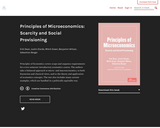
Principles of Economics covers scope and sequence requirements for a two-semester introductory economics course. The authors take a balanced approach to micro- and macroeconomics, to both Keynesian and classical views, and to the theory and application of economics concepts. The text also includes many current examples, which are handled in a politically equitable way.
- Subject:
- Economics
- Social Science
- Material Type:
- Textbook
- Provider:
- OpenOregon
- Author:
- Benjamin Wilson
- Erik Dean
- Justin Elardo
- Mitch Green
- Sebastian Berger
- Date Added:
- 06/15/2019

With this free video resource, students will be exposed to the economic way of thinking. Students will understand how to use economics in their lives and, ultimately, you’ll see the world differently-- all through engaging Hollywood production style videos.
Educators can use MRU's videos in a variety of ways, to include “flipping” the classroom, as study aids, supplementary material, concept reinforcement, or even as a full course offering.
In MRU's Principles of Microeconomics course, covers fundamental concepts like supply and demand and equilibrium. We also answer questions such as: How are prices determined? What did Adam Smith mean when he said the market process works like an “invisible hand”? How is it that we have access to fresh roses in very cold cities every Valentine’s Day? All key topics are covered to include competition, monopoly, price discrimination, externalities, public goods and more.
There are no prerequisites for this course, and it is accessible to beginners.
------------------------------------
What is Marginal Revolution University (MRU)?
Many of us can remember our first great economics teacher who fundamentally changed how we see the world. At MRU, we try and deliver that experience to millions worldwide through video.
Founded as a nonprofit in 2012 by George Mason University economics professors Tyler Cowen and Alex Tabarrok, MRU is building the world’s largest online library of free economics education videos -- currently weighing in at more than 800 videos.
- Subject:
- Economics
- Social Science
- Material Type:
- Full Course
- Homework/Assignment
- Lecture
- Module
- Syllabus
- Author:
- Alex Tabarrok
- Tyler Cowen
- Date Added:
- 05/10/2020
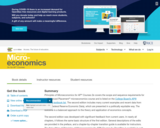
Principles of Microeconomics for AP Courses covers the scope and sequence for a one-semester Advance Placement Microeconomics course. The book is on the example textbook list for the AP course here. The text also includes many current examples, including; the Keystone Pipeline, Occupy Wall Street, and debates over the minimum wage.
- Subject:
- Economics
- Social Science
- Material Type:
- Textbook
- Provider:
- Rice University
- Provider Set:
- OpenStax College
- Author:
- Amyaz Moledina
- Andres Jauregui
- Craig Richardson
- Cynthia Gamez
- Dan MacDonald
- David Shapiro
- Diane Keenan
- Eric Dodge
- Ralph Sonenshine
- Steven Greenlaw
- Timothy Taylor
- Date Added:
- 08/01/2015

Microeconomics with Ethics is an introductory college-level textbook that will enable students to understand current controversies about how to best organize an economic system. The approach emphasizes economic model development and how to interpret their results. The textbook first introduces an Edgeworth box to explain the gains from trade and comparative advantage. We then introduce market complexity, stepwise, by introducing monopoly, oligopoly, and finally perfect competition with supply and demand. Government policy is analyzed under perfect competition and in the presence of market imperfections such as externalities, public goods and common resources. Students will learn why some economic models support limited government while others support a much larger role for government. The textbook diverges only slightly from traditional neoclassical textbooks by demonstrating why individual self-interest must be constrained by ethical behavior to achieve economically efficient outcomes. For example, the acceptance of theft, equivalent to a violation of property rights, may more readily satisfy someone’s self-interest, but would nonetheless undermine the development of markets involving mutually voluntary exchange. Other unethical behaviors examined include deceptive business practices, efforts to undermine free competition, the unwillingness to consider community well-being, and economic disloyalties. Lastly, the text highlights how both private institutions, such as religions, and public institutions, such as criminal justice systems, can constrain unethical behaviors and thereby promote economic efficiency. Students will come away from this course with a rich understanding of the modern economic system and a clearer perspective on the different opinions across the economic and political spectrum about how to best organize an economy.
- Subject:
- Economics
- Social Science
- Material Type:
- Full Course
- Textbook
- Author:
- Steven Suranovic
- Date Added:
- 08/26/2024
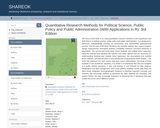
The focus of this book is on using quantitative research methods to test hypotheses and build theory in political science, public policy and public administration. It is designed for advanced undergraduate courses, or introductory and intermediate graduate-level courses. The first part of the book introduces the scientific method, then covers research design, measurement, descriptive statistics, probability, inference, and basic measures of association. The second part of the book covers bivariate and multiple linear regression using the ordinary least squares, the calculus and matrix algebra that are necessary for understanding bivariate and multiple linear regression, the assumptions that underlie these methods, and then provides a short introduction to generalized linear models.
The book fully embraces the open access and open source philosophies. The book is freely available in the SHAREOK repository; it is written in R Markdown files that are available in a public GitHub repository; it uses and teaches R and RStudio for data analysis, visualization and data management; and it uses publically available survey data (from the Meso-Scale Integrated Socio-geographic Network) to illustrate important concepts and methods. We encourage students to download the data, replicate the examples, and explore further! We also encourage instructors to download the R Markdown files and modify the text for use in different courses.
- Subject:
- Economics
- Political Science
- Social Science
- Material Type:
- Textbook
- Provider:
- SHAREOK
- Author:
- Copeland Gary
- Fister Aaron L
- Hughes Tyler
- Jenkins-smith Hank C
- Nowlin Matthew C
- Ripberger Joseph T
- Wehde Wesley
- Date Added:
- 08/18/2017
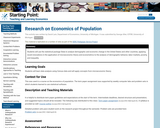
Research paper on the economics of population using international census data.
- Subject:
- Economics
- Social Science
- Material Type:
- Activity/Lab
- Provider:
- Science Education Resource Center (SERC) at Carleton College
- Provider Set:
- Pedagogy in Action
- Author:
- George Alter
- Date Added:
- 06/09/2020

This book develop provides detailed foundational tools to assess and evaluate the costs and benefits associated with public or private decision making through a cost-benefit analysis (CBA). This book is targeted at students with preliminary foundations in economics. The content and activities have been developed to support learning in ECON2101 Cost Benefit Analysis offered as a course at UQ.
- Subject:
- Economics
- Social Science
- Material Type:
- Textbook
- Provider:
- University of Queensland
- Author:
- Suzanne Bonner
- Date Added:
- 06/28/2023
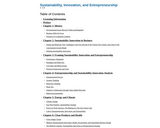
This book is suited for the Entrepreneurship or Innovation course with an emphasis on Sustainability or for a course devoted entirely to Sustainability.
What are the trends and forces underlying the changing character of the business-environment relationship? How they are creating significant entrepreneurial opportunities for individuals and companies? Around the world, the movement toward “sustainable development” has caused many firms to adopt policies and practices that reflect what is sometimes called a “sustainable business” or “triple bottom line” approach. “Triple bottom line” refers to the demonstration of strong performance across economic, social, and environmental indicators. Those measures serve as indicators of fiduciary responsibility to a growing set of concerned investors and therefore can help ensure access to capital. They also enable innovators to lower costs, create strategic differentiation, reduce risk, and position themselves for competitive advantage over rivals less attuned to trends.
The deep roots of sustainability thinking are now evident in widespread and increasingly visible activities worldwide, and Sustainability, Innovation, and Entrepreneurship explores this evolution; its necessity, its implications and its progression.
- Subject:
- Business and Communication
- Economics
- Social Science
- Material Type:
- Textbook
- Provider:
- The Saylor Foundation
- Provider Set:
- Saylor Textbooks
- Author:
- Andrea Larson
- Date Added:
- 01/01/2011

Sustainable Property Management is a 150-page, peer-reviewed open textbook intended for students majoring in property management and real estate at both the undergraduate and graduate levels. It can be incorporated into an existing property management operations course or used for a stand-alone course focused on sustainable property management. Although sustainability, as used in the real estate context, is about preserving the environment, it is about more than that. In sustainable property management, sustainability encompasses three spheres—environmental, social, and economic. Sustainable property management is about reconciling these three spheres throughout the operations and maintenance phases of the building lifecycle in such a way that a balance is achieved between economic development and the protection of environmental and social resources.
This textbook explains how ecologically sustainable concepts may be implemented throughout the property management operation functions while also considering the other spheres of sustainability. It also incorporates the theme of sustainable building practices as a human science as well as a building science by highlighting motivations and impacts to various stakeholders. The author draws on industry examples to illustrate these concepts and provides many experiential activities through which students can apply these concepts.
ISBN
ISBN PDF 978-1-957213-38-5
ISBN Pressbooks 978-1-957213-40-8
ISBN ePub 978-1-957213-39-2
ISBN Print (color) 978-1-957213-37-8
URL to order print version: https://www.amazon.com/dp/195721337X
Customizable class slides for this book are available at http://hdl.handle.net/10919/113422.
Table of Contents
Chapter 1: Introduction to Sustainable Property Management
Chapter 2: The Three Spheres of Sustainable Property Management
Chapter 3: Stakeholder Motivations for Sustainable Property Management Practices
Chapter 4: Sustainable Building Maintenance and Repair Practices
Chapter 5: The Intersection of Sustainable Property Management and Risk Management
Chapter 6: Integrating Sustainable Practices into Marketing and Leasing
Chapter 7: Financial Evaluation of Sustainable Building Initiatives
Chapter 8: Human Health Considerations
Find, Adapt, and Share Resources
Customizable class slides for this book are available at: http://hdl.handle.net/10919/113422.
- Subject:
- Applied Science
- Ecology
- Economics
- Environmental Science
- Life Science
- Social Science
- Material Type:
- Textbook
- Author:
- Erin A. Hopkins
- Date Added:
- 05/19/2023
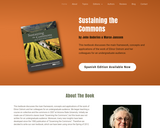
In this book you will learn about institutions–the rules and norms that guide the interactions among us. Those rules and norms can be found from traffic rules, rules in sports, regulations on when and where alcohol can be consumed, to constitutional rules that define who can become president of the United States of America. Rules and norms guide us to cooperative outcomes of so-called collective action problems. If we rely on voluntary contributions only to get anything done, this may not lead to the best results. But research also shows that coercion of people to comply to strict rules do not necessary lead to good outcomes. What combination of sticks and carrots is needed to be successful to solve collective action problems such as sustaining the commons?
- Subject:
- Applied Science
- Economics
- Environmental Science
- Political Science
- Social Science
- Material Type:
- Textbook
- Author:
- John Anderies
- Marco Janssen
- Date Added:
- 12/05/2019